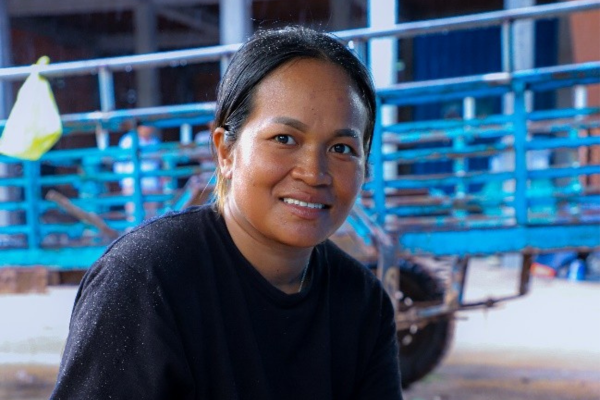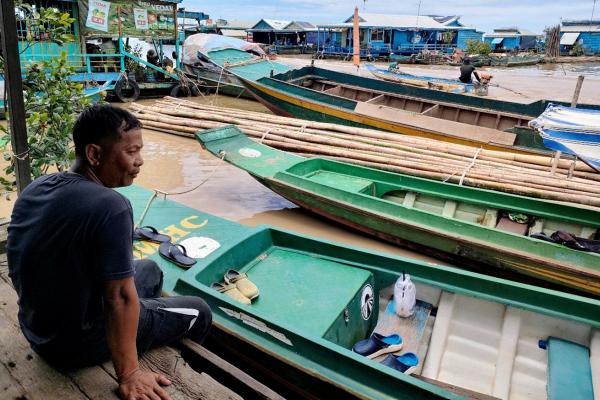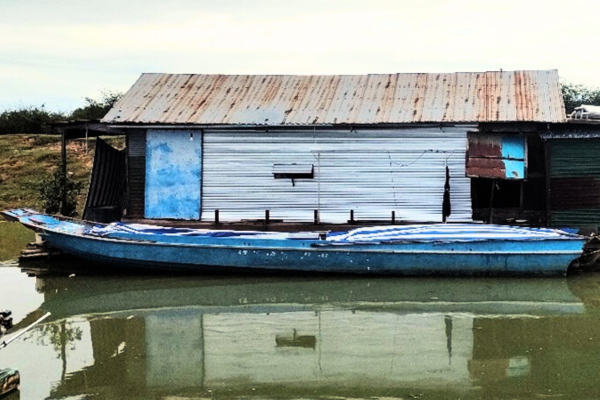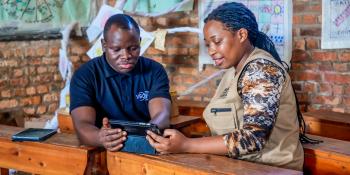The Tonle Sap Lake is the largest freshwater lake in South East Asia and one of the most productive inland fisheries in the world. However, the effects of climate change accompanied by overfishing, deforestation, and the depositing of untreated industrial and domestic sewage, are all threatening the natural balance of the region.
VSO’s GREEN (Generating Resilient Environments and Promoting Socio-Economic Development of the East Tonle Sap Lake) project in Cambodia ran a green economy incubator program, supporting youth and women-led businesses in adopting green concepts and support alternative livelihoods to fishing. In this blog, here from three people who have created their own green businesses, thanks to VSO.
Improving access to clean and safe drinking water

After witnessing her family and community suffering from health problems caused by consuming unclean water from Tonle Sap Lake or untreated water points, 38-year-old, Sreyluch Chhorn decided to start a family-based drinking water treatment business.
However, the COVID-19 pandemic caused a significant decline in income for Sreyluch, and she feared she’d have to abandon her business. With support from the GREEN project, she learned valuable entrepreneurship skills such as how to create a business plan and develop a marketing strategy.
She recalls, “At first, I did not understand anything about cost analysis and recordkeeping and did not manage my money carefully. Now, I have learned these skills and developed a marketing strategy. In addition, I relocated my drinking water purification plant to a proper place instead of under my mother’s house. As a result, it’s more hygienic, and I can sell more drinking water, doubling both the production and income and providing part-time jobs for three workers.”
VSO volunteers also helped Sreyluch come up with environmentally friendly ways to manage her business. She proudly shares, “I now collect used plastic bottles from my customers and community and a nearby business owner buys my collected bottles, as well as those returned by my customers.”
She adds, “With the support of a $1000 (USD) grant from VSO, as well as income from my business, I upgraded my water drinking treatment plant building and also bought large water bottles that are reusable and recyclable, resulting in more profit as well as reducing the use of single-use plastic bottles.”
Sreyluch is also using her income to help those most in need. Her husband shares:
To help poor families afford safe drinking water, we distribute big water bottles [20 litres] free of charge and offer them at a discounted price.”
He adds, “Since increasing the capacity of our safe drinking water supply, approximately 90% of our fishing community customers have stopped using contaminated water from the lake, helping to prevent the prevalence of waterborne diseases among them and their children.”
Creating opportunities in eco-tourism

Bun Chanthouen is a single man, living with his 79-year-old aunt. He was born and raised in the floating village of Phum 1, located on the lake.
During the COVID crisis in 2020, all tourism activities suddenly stopped, and the village’s economy has been struggling ever since. Furthermore, climate change has created severe consequences in the area with extreme droughts, sudden floods, and the decrease of the fish population.
In 2023 he joined the GREEN project as a student in the Basic Education Equivalency Program (BEEP) which supports out-of-school-youth to gain their education. He mentions: “I dropped out of school in grade 8 to start working to provide for my family and never completed my secondary education.”
After gaining his BEEP certification, Mr Chanthoeun joined the GREEN project’s business incubator program in 2024.

He reflects “I learnt a lot from VSO on how to set up a business. I was supported to create a business plan and received a $1500 (USD) grant which I invested in repairing my house to make it a homestay for tourists who want to experience a night in the floating village.”
In addition, having a supportive attitude and a strong dedication to encouraging others in his community, Mr Chantheoun earned a lot of trust from his community members. Later in April 2024, he was elected to be the committee leader of Kampong Luong Tourism Floating Village. The mission of the committee is for its members to support each other and have a clear vision to lead their own development.
He says, “I was very excited to be selected as the committee leader. I want to help my community by creating a clean, safe environment where we can attract more visitors to the community and increase our income.
A new lease of life for Cambodia’s mung bean farmers
Stueng Chrov and Preaek Spean are two villages located in the Kampong Chhnang province in the Tonle Sap Lake region. This area is characterized by an exceptional phenomenon: the reversal of its waters.
During the rainy season, water flows from the Mekong River into the lake, and during the dry season, it flows from the lake back into the Mekong. This unique geographical situation means the area is heavily affected by climate change. There are sudden floods and more intense and frequent droughts, with records broken every year since 2020.
Being a farmer in this part of Cambodia is not an easy task. This is why most farmers have chosen to cultivate mung beans, a plant that can adapt well to this type of climate.
However, farmers still face significant challenges. Many of them lack real agricultural skills and rely on traditional methods that do not allow for optimal yields. Moreover, due to limited resources they cannot invest in modern agricultural equipment, leading to an overreliance on fertilizers and pesticides, that are both expensive and harmful.
VSO works alongside the Provincial Department of Agriculture, Forestry and Fishery (PDAFF), to provide training on sustainable mung bean farming techniques and provide subsidies on farming materials, helping over 670 farmers to set up their farms.
Voeun Sokheam owns a 12-hectare mung bean farm which used to be her sole income to provide for her four children. She says “Before participating in the training with VSO, I had never attended any technical training on mung bean farming. The other farmers from my village and I grew mung beans solely based on our traditional knowledge and experience.”
"We faced numerous challenges, including the proper understanding of how to use pesticides and chemical fertilizers effectively.”
After completing the program, Voeun chose to volunteer as a farmer trainer, so she could share her knowledge with fellow farmers in her community.
Farmer trainers provide technical training to other farmers on seed selection, land preparation, chemical and organic fertilizers, compost making, pest management, pre- and post-harvest activities and even production plans. Through this local knowledge sharing, farmer trainers ensure the suitability and longevity of the project.
Ms. Voeun Sokhem shares: “I am very happy to have been selected as a farmer trainer. I have conducted several training sessions for mung bean farmers in my village and provided coaching and mentoring throughout the mung bean growing season. I am confident that sharing good practices and technical knowledge about mung bean farming will greatly benefit the entire community.”
Ms. Voeun Sokhem, also received a grant from VSO enabling her to start a business as an input supplier for mung bean farmers, selling fertilizers and pesticides at a fair price, with no interest rates.
She says: “I had never had the idea of starting up a business before. However, I realized that most of my community members struggled to access resources for their farms. They often need to travel far and buy from expensive supplies with high interest rates.”
Today, Ms. Voeun Sokhem’s business is thriving. She says, "Currently, I have 20 farmers who purchase mung bean farming inputs from me and I earn approximately $125 to $150 (USD) during the mung bean growing season. In the future, I hope to expand my client range from 80 to 100 mung bean farmers in my village and beyond”.
About the GREEN project
The GREEN project (March 2021 - February 2025) was funded by the European Union and aimed to enhance the socio-economic resilience of vulnerable fishing communities in the East Tonle Sap Lake in Cambodia.
Read more

Using play to inspire learning in Rwanda
Learn how volunteers like Celestin are supporting children in Rwanda to learn through play. Children are taught problem solving, strategic thinking and inter-personal skills, all while enjoying the learning process.
Three ways we’re supporting local, eco-friendly business practices in Cambodia
On the Tonle Sap Lake, climate change, overfishing, deforestation, and the depositing of untreated industrial and domestic sewage, are all threatening the natural balance of the region. VSO has supported local people to adapt to this environment by developing green business practices.

The two volunteers empowering girls and young women in Mozambique
Nelma and Carmirene and are two volunteers working on VSO's EAGLE project in Mozambique. For Nelma and Carmirene, education is not just about school, it is about meeting people where they are and using the right tools to challenging harmful norms. Here are their stories.
